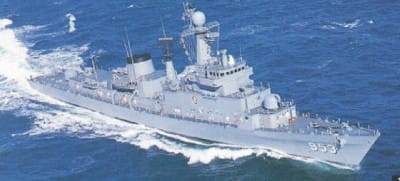Decommissioning and re-commissioning of a Navy ship

Among the navies all over the world, Commissioning is the act or ceremony of placing a warship on active duty with the country's naval force. The commissioning ceremony marks the acceptance of a warship as a unit of the operating forces in the Bangladesh Navy. Thereafter the ship is officially referred to as the Bangladesh Navy Ship (BNS). A commission is the fixed period of time in which a warship, with its full complement of officers and men, is allocated to specific duties as a part of a fleet/ squadron/ flotilla.
The ceremonies involved are rooted in centuries old naval traditions. BNS Khalid Bin Walid (Bangabandhu) was launched in Korea in 1999 and was endowed a ship hull with her identity. The engineering plant, weapon and electronic systems, galley, and multitude of other equipment, required to transform the new hull into an operating and habitable warship were installed and tested. The commanding officer, ship's officers, the non commissioned officers and seamen were selected and sent to Korea for training and intensive familiarization with their new ship. The new ship underwent sea trials during which deficiencies were rectified and it finally arrived in Bangladesh after a sea passage of almost 17000 km. Through custom and usage, however, a fairly standard practice was followed to commission her, the essentials of which were officers and crew members of the new ship were assembled on the naval jetty area.
Formal transfer of the ship to the prospective commanding officer was done ceremonially by the then PM on behalf of the honourable President. The Chief Guest read the commissioning directive, the national anthem was played, the jack and ensign were hoisted, and distinctive commissioning pennant broken at the mast head, and the ship was placed in commission as the BNS Bangabandhu in June 2001thorugh a public ceremony
Normally, after a ship is commissioned she is supposed to continue in that state until she is paid off, at which time her ships company is dispersed. Decommissioning of a warship is normally overseen by the commander of the fleet and is usually attended by other senior officers and government officials. After the Chief Guest's arrival honours are rendered, the national anthem is played to commence the ceremony, a résumé of the ship's history is read out, and after receiving the last report from various departments the commanding officer asks his superior officer for permission to decommission the ship. After granting it, the attending officers and guests are piped ashore with appropriate honours. Once the crew is ashore, the commanding officer orders, "Strike eight bells," and all present salute as the national ensign and jack are lowered. The commissioning pennant is hauled down last. The commanding officer is presented the last commissioning pennant to fly over the ship to keep as a memento, and the crew member with the most years of service keeps the last ensign flown by the ship.
The sequence of events in the Navy after BNS Bangabandhu's commission was totally dictated by those close to the seats of power. PM's office, without going through MOD or Armed Forces Division, formed a committee to investigate the ships purchase. President of one of the original selection committee was appointed the president of this committee, totally disregarding navy rules and other rules of the country. The rule clearly states that anybody associated with the purchase before, cannot be appointed in such investigation committee. But this was intentionally done with ulterior motives.
All the committee members were then promoted to higher rank and the President of the Committee was rewarded with the highest appointment in the service. Events were dictated in such a fashion that the ship could remain in active service only till Feb 2002 and disregarding all norms, the BNS Bangabandhu was decommissioned, without following any rules of the navy and placed into Reserve class iii without any justification.
According to Bangladesh Navy Regulations, Reserve class iii means "Ships with major defect requiring refit before service and therefore at extended notice and normally not stored". It was not known for what reasons the brand new ship was decommissioned after only 8 months of active duty. She was not due for major refit at all as required by the Navy Regulation and did not have chronic major problems which needed such out of proportion action by the navy. Warranty repairs were supposed to be done even during its commission.
Point to note is that the navy lowered the commissioning pennant of the ship but did not hand over the same as part of a proper decommissioning. Contrary to any existing rule, the Navy allowed the ship to sail to the sea with her ensign without commissioning pennant, ship's commanding officer and full ship's crew remained onboard. Although it is not supposed to be stored, she must have been provided with all types of stores, food, clothing and even arms and ammunitions.
It has been reliably learnt that the ship has been fitted with Chinese missile system against the original selection, which is yet to be functional with the ship's system. It is alleged that the system cost the navy almost half of the total ships price.
We congratulate the caretaker government and all others associated with the decision of putting the ship into commission, which is the only state of art ship Bangladesh Navy has acquired so far. But an important question remains why the name of the ship has been changed. It would be quite difficult to find another instance of changing a ship's name in the same navy unless it was transferred to some other navy. Members of the public have every right to know the real reasons for changing the name of the ship. It would have been only proper for the government to keep the same name which would have set a good precedence for our future generations. But the good initiative of the present government to commission the ship must be followed up with some other actions as to who and what prompted the authority to take the brand new ship out of commission. Was it proper as per Navy Rules or were the rules manipulated to satisfy some individual at the cost of the service and the nation?
The nation has a right to know how and why more than five years of the ship's useful life have been wasted. She could not be used for protection of the sea resources for which the nation has paid and the officers and men were deprived from getting much needed training from the only state of art ship of BN. Persons responsible for such action must answer as to what made them place the ship in reserve class three, why she was allowed to proceed to sea violating the rules and regulations, allowed installation of missiles system against the original selection which is yet to be operational, how the ship officers and men were paid and the stores were issued to a decommissioned ship. It would be an injustice if such questions are not answered in right earnest and those responsible are not brought to book. Otherwise, tendency to violate rules for achieving their egoistic whims would continue.

 For all latest news, follow The Daily Star's Google News channel.
For all latest news, follow The Daily Star's Google News channel. 



Comments